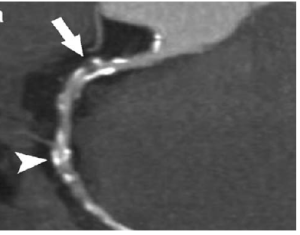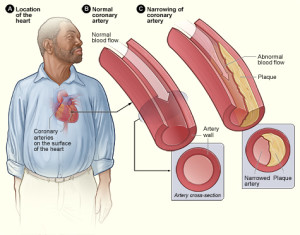The phrase “mammogram of the heart” refers to the heart scan that detects calcium build-up in the coronary arteries. The phrase was coined by the pioneers in this technology to try to impress on the public and on the medical community the simplicity and value of this test.
Just as a mammogram can identify cancer before it spreads, a heart scan can identify the presence of coronary artery disease before it causes symptoms. And like the mammogram, the heart scan is easy to perform, uses a low amount of radiation, and is inexpensive.
In some respects, the heart scan is actually much more reliable than a mammogram, because abnormalities on a mammogram frequently turn out to be benign, whereas coronary calcium build-up visible on a heart scan always indicates atherosclerosis, the number one cause of heart attacks and sudden cardiac death.
Those of you who have watched The Widowmaker documentary will understand the unfortunate politics, feuds, and money matters that have kept this test from being more widely embraced.
Here are the basics about this test:
1. Calcium means plaque. Some amount of calcium build-up is extremely common in any vascular plaque. Note that the calcium build-up in a vascular plaque has nothing to do with the blood level of calcium that one can measure with a routine blood test. The two are essentially unrelated.
2. Plaque is now easily detectable. Because calcium is very opaque to x-ray beams, calcium build-up can be easily detected by current scanning technology. It shows up as a very bright spot on the surface of the heart and there is no need to inject dye. The scan can be performed in a matter of a few minutes, and the test is relatively inexpensive (out-of-pocket cost range is $100-$375 in the SF Bay Area).
3. The heart scan is a great screening test. Because the heart scan is very sensitive and specific for plaque build-up, and because coronary artery disease is a very common problem, affecting millions of people in our country and worldwide, the heart scan is an excellent test to screen people who may not know they have plaque build-up in their coronary arteries.
4. The coronary calcium score. The heart scan provides a coronary calcium score. Any score above zero is abnormal, but the higher the score, the more extensive the number of plaques, and the higher the risk of future complications.
5. An opportunity to intervene. Detecting coronary artery disease early affords an opportunity to intervene and change the course of things before complications occur, such as sudden cardiac arrest or myocardial infarction (heart attack). The intervention may involve lifestyle changes, drugs, and possibly some procedure, depending on the circumstances. I will address this topic in upcoming articles.
If you are a man over age 40 or a woman over age 50 (or you have reached menopause), we strongly urge you to consider getting a heart scan. You may consider obtaining one at a younger age if you have a very strong family history or have strong risk factors.
If you encounter any difficulty in regards to obtaining a heart scan, please take advantage of our Coronary Health Starter Kit, which couples a scan order with an affordable telephone consultation. We are confident that you will find this service to be of great value.
What is the take-home message from all this?
- The heart scan is an excellent test to detect plaque build-up which is always asymptomatic in its early stages. Because complications of plaque build-up can be sudden and sever, such as sudden cardiac arrest or a heart attack, early detection of the problem is essential.
- The heart scan is very reliable and far superior to the standard approach to predict heart disease, which relies on statistical risk factors.
- The heart scan is easy to perform, takes only a few minutes, and is reasonably affordable.
- We urge to consider having one if you are in the appropriate age category. Feel free to give us a call to discuss how to get a heart scan if you live in the SF Bay Area or anywhere in California.
I hope you have found this article informative. If you enjoy what we write, remember to sign up for our free monthly newsletter at the bottom of this page.


